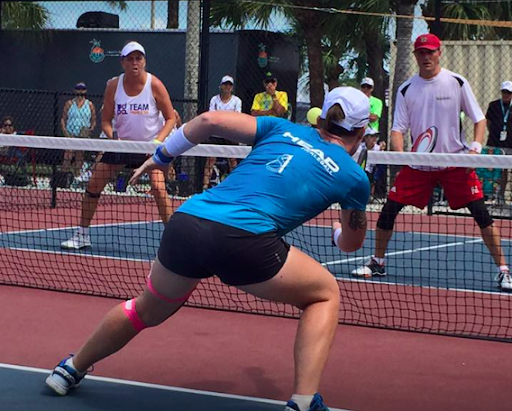I have a friend who always says “Everyone can hit hard in pickleball”.
I totally agree with this.
Hitting the ball hard in pickleball is easy to do and it’s fun.
But that’s the trap.
How to stop yourself from just hitting the ball hard and changing the pace of the rally?
It's those who can and choose to dink, move the ball around, and demonstrate ball and body control that truly know the game.
Let's talk dinking...

Image credit: Sarah Ansboury Pickleball
Dinking really is a crucial skill in pickleball.
For those of you reading who are just getting into pickleball, this type of shot involves hitting the ball softly and with precision over the net, keeping it low and in the non-volley zone (the kitchen).
You’ll want to try and get the ball to descend as it’s crossing the net and aim for the other teams’ non-volley line or their feet. Here are some of my tips to improve your dinking game in pickleball:
Grip and Ready Position:
Hold your paddle with a relaxed grip (3/10 in pressure)
Stand with your knees slightly bent, weight on the balls of your feet, and your paddle in front of you at an eleven o’clock position
Use a Continental Grip:
Try using the Continental grip is often recommended for dinking as it allows you to easily adjust the angle of your paddle
Focus on Soft Contact:
Use a gentle, controlled stroke to make soft contact with the ball, with the movement coming from the shoulder
Let the ball come to your paddle, don't reach out aggressively and use your wrist to flick the ball
-Nov-05-2023-01-01-18-3128-PM.png?upscale=true&width=512&height=245&name=unnamed%20(1)-Nov-05-2023-01-01-18-3128-PM.png)
Image credit: Quora
Watch the Ball:
Keep your eye on the ball throughout the entire dinking exchange to ensure precise contact
Maintain a Low Net Clearance:
Try to keep the ball as low as possible over the net while still clearing it
A good target is to aim for a net clearance of 12-24 inches (30-61 cm)
Vary Your Shots:
Mix up your dinks by hitting them to your opponent's forehand, backhand, and the middle
Change the pace and angle of your shots to keep your opponent guessing
Control the Angle:
Angle your paddle face downward to control the trajectory of the ball
Work on Your Footwork:
Move your feet and body to get into the best position to make each dink
Avoid reaching too far for the ball, as this can lead to errors
Practice with a Partner:
Dinking is all about consistency, so practice with a partner to develop a rhythm
Start by dinking from the non-volley zone (kitchen) and gradually move back as your skills improve
Stay Patient:
Avoid getting impatient and trying to force a winner
Dinking is about waiting for the right opportunity to attack
Communication with Your Partner:
In doubles play, communicate with your partner about who will take which dinks to avoid confusion and ensure good coverage of the court
Understand Your Opponent:
Pay attention to your opponent's strengths and weaknesses and adjust your dinking strategy accordingly
Stay Relaxed:
Tension in your arms and body can lead to mistakes. Stay relaxed to maintain better control
Mental Focus:
Dinking is as much a mental game as it is physical. Stay focused, be patient, and stay in control of your shots
Final Thoughts...
Remember that dinking is an essential part of the pickleball game, especially in doubles play, and it's often the key to setting up a winning shot. Practice regularly and develop your dinking skills to become a more well-rounded and effective player.
This article was taken from our 'Control the Kitchen' Newsletter, if you're interested in receiving more content like this, please feel free to sign up using the subscribe section located at the bottom left of this page (or underneath the article if you're on mobile), thanks!